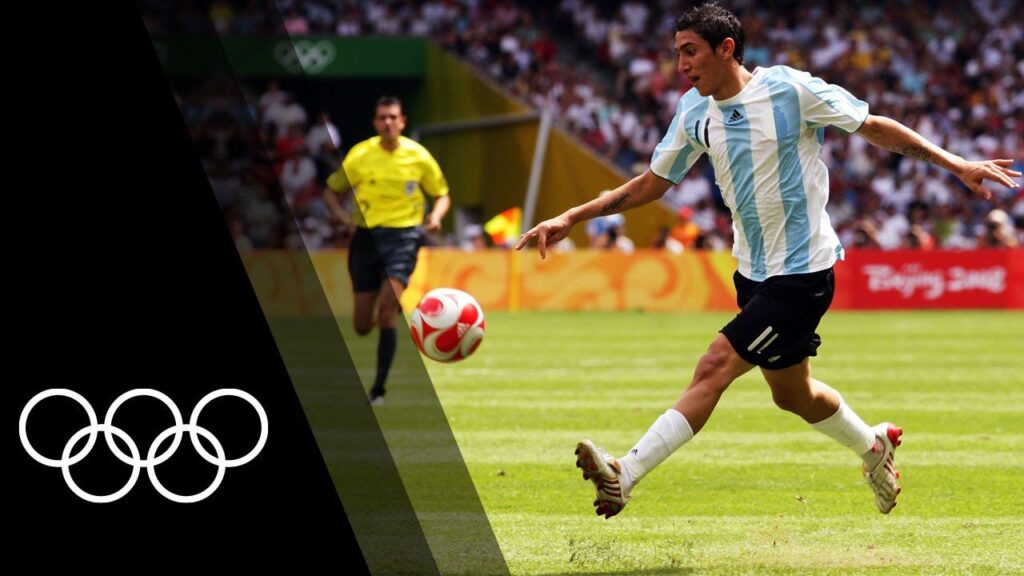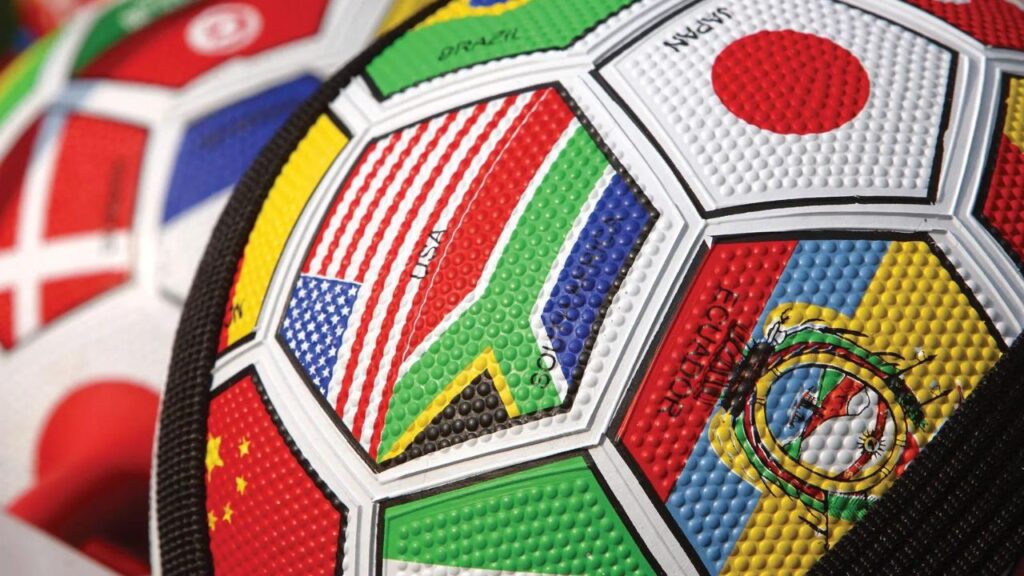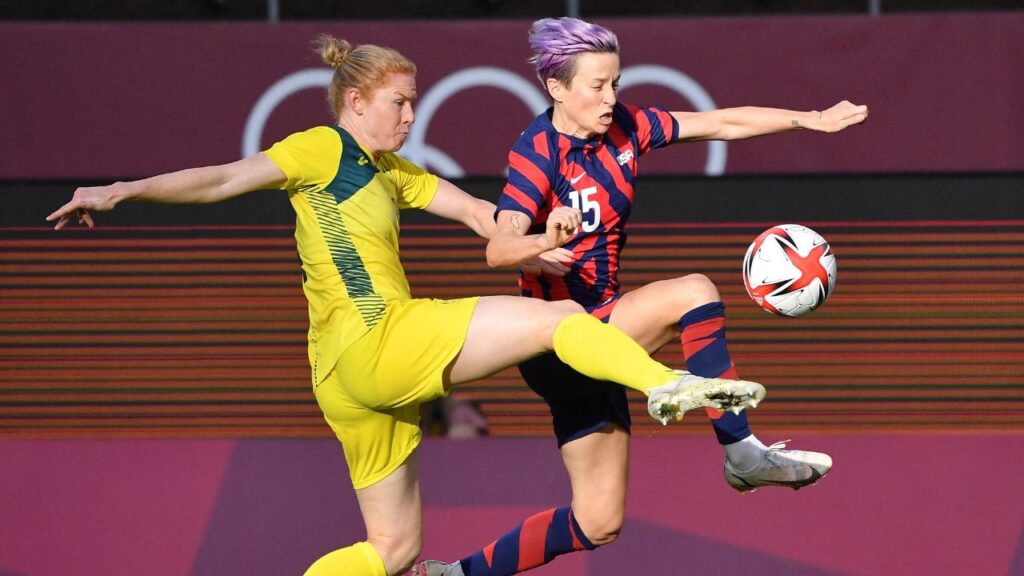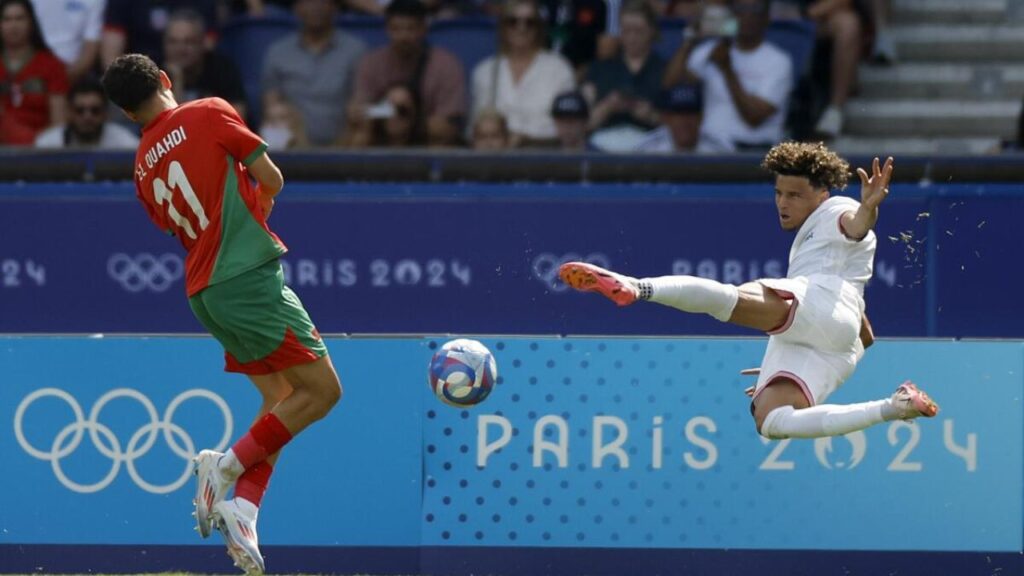Last updated on December 29th, 2024 at 11:35 am

Why Is Olympic Soccer Not Popular? Olympic soccer isn’t as popular due to the dominance of the FIFA World Cup, restrictions on player age, and less star power.
Soccer, or football as it’s known across most of the globe, is undeniably the world’s most popular sport. With billions of fans, the beautiful game brings nations together during international tournaments, particularly the FIFA World Cup.
However, one of the most significant global sporting events, the Olympics, seems to struggle to generate the same level of excitement and viewership when it comes to soccer. This contrast raises an intriguing question: Why is Olympic soccer not popular?
To understand this, we must delve into what Olympic soccer entails and examine the various reasons contributing to its comparatively low profile.
Table of Contents
What Is Olympic Soccer?
Olympic soccer is a football competition held as part of the Summer Olympic Games. The men’s tournament has been part of the Olympics since 1900, while the women’s tournament was introduced much later, in 1996.
The competition format generally follows a traditional tournament structure, beginning with a group stage and progressing through to the knockout rounds, culminating in the final match where the gold medal is awarded.
The men’s Olympic soccer tournament is distinct from other major international football competitions because of its unique restrictions.
Specifically, the tournament is primarily an under-23 competition, with teams allowed to include only three over-age players. [Why Is Olympic Soccer Not Popular?]
This rule is intended to foster the development of young talent and differentiate the Olympic tournament from the more prestigious FIFA World Cup, which features the best players in the world without age restrictions.
The women’s Olympic soccer tournament, in contrast, has no age restrictions, which allows nations to field their strongest teams, similar to the FIFA Women’s World Cup.
Despite this, Olympic soccer, in general, does not command the same attention or prestige as other football tournaments. Understanding why requires an exploration of several contributing factors.

7 Reasons Why Is Olympic Soccer Not Popular?
1. Age Restrictions on Players
One of the primary reasons for the lack of popularity of Olympic soccer, particularly in the men’s tournament, is the age restriction placed on participating players.
The under-23 rule significantly limits the participation of the world’s top-tier players, many of whom have already established themselves on the global stage by the time they are 23.
By imposing this age limit, the tournament often features younger, less experienced players who may not have the same level of recognition or skill as their older counterparts.
This restriction is in stark contrast to the FIFA World Cup, where the best players from around the world compete, regardless of age.
Fans who are accustomed to seeing the likes of Lionel Messi, Cristiano Ronaldo, and other global superstars during the World Cup may find Olympic soccer less compelling because many of these household names are absent.
As a result, the overall competitiveness and excitement of the tournament are diminished, contributing to its lower popularity. [Why Is Olympic Soccer Not Popular?]
Moreover, the inclusion of only three over-age players per team often leads to strategic decisions by national teams about which positions or roles require more experience.
This rule can lead to an unbalanced squad composition, where the mix of young and seasoned players doesn’t always gel effectively. Consequently, the quality of play may suffer, further reducing fan interest.
2. FIFA World Cup Overshadows the Event
The FIFA World Cup is the crown jewel of international soccer. Held every four years, it is the most prestigious tournament in the sport, drawing massive global attention and participation.
The World Cup is where legends are made, and it represents the ultimate goal for players, coaches, and fans alike. With such a monumental event on the football calendar, it’s no surprise that Olympic soccer struggles to compete for the same level of prestige and interest.
Olympic soccer, despite its long history, is often seen as a secondary event, especially in the shadow of the World Cup. [Why Is Olympic Soccer Not Popular?]
For many football enthusiasts, the World Cup is the pinnacle of international competition, offering the highest level of play and the most coveted trophy in the sport.
The Olympics, on the other hand, is viewed as a multi-sport event where soccer is just one of many competitions. This perception diminishes the importance of Olympic soccer, making it less appealing to fans who are primarily interested in top-level football.
Additionally, the timing of the Olympics often clashes with the start of the European football season, which further reduces the attention that Olympic soccer receives.
Many fans and media outlets are more focused on the beginning of domestic leagues like the English Premier League, La Liga, and Serie A, rather than the Olympic tournament. This competition for viewership further relegates Olympic soccer to a lower tier of importance in the football world.

3. Lack of Star Power
A significant factor contributing to the lower popularity of Olympic soccer is the lack of star power, particularly in the men’s tournament. [Why Is Olympic Soccer Not Popular?]
The age restrictions, coupled with the reluctance of top clubs to release their players for the Olympics, means that many of the world’s best-known and most talented players do not participate in the tournament.
In the world of sports, star power is a major draw for audiences. Fans want to see their favorite players compete on the biggest stages, and the absence of these stars at the Olympics significantly diminishes the tournament’s appeal.
While some nations may still field strong teams, the overall level of talent is generally lower than in other international competitions like the FIFA World Cup or the UEFA European Championship.
Moreover, the global football community is heavily invested in following the careers of its top players. When these players are absent from a major tournament like the Olympics, the event naturally attracts less attention.
Without the presence of superstars to create headlines and memorable moments, Olympic soccer struggles to capture the imagination of the broader football audience.
4. Crowded Sports Calendar
The timing of the Olympic Games presents another challenge for the popularity of Olympic soccer. The Olympics are typically held during the summer, a period when the global sports calendar is already packed with other major events.
This crowded schedule means that Olympic soccer often has to compete for attention with other sporting events, including domestic football leagues, European championships, and international tournaments.
For football fans, the summer is usually a time of transition between seasons, with a focus on transfer news, preseason matches, and the buildup to the start of the new club season.
In Europe, which is home to many of the world’s top football leagues, the timing of the Olympics coincides with the start of the domestic football season.
As a result, fans and media are often more focused on their favorite clubs and leagues rather than the Olympic soccer tournament.
This competition for attention makes it difficult for Olympic soccer to stand out in the crowded sports landscape. [Why Is Olympic Soccer Not Popular?]
With so many other events happening at the same time, the Olympics may not be the top priority for many football fans, particularly those who are more interested in club football than international tournaments.

5. Lower Prestige and Historical Significance
Unlike the FIFA World Cup or continental tournaments like the UEFA European Championship or Copa América, Olympic soccer does not carry the same historical significance or prestige.
While winning an Olympic gold medal is a significant achievement in many sports, in soccer, it is often seen as secondary to winning the World Cup or a continental championship.
The World Cup, with its long history and tradition, is widely regarded as the most prestigious tournament in international soccer.
Winning the World Cup is the ultimate goal for players and nations, and it represents the pinnacle of achievement in the sport. In contrast, the Olympic soccer tournament, particularly the men’s competition, is often viewed as a development tournament rather than a major international competition.
This perception is reinforced by the fact that the Olympic tournament does not feature the best players in the world, due to the age restrictions and club commitments.
As a result, the tournament lacks the prestige and significance that would make it more appealing to fans and players alike. [Why Is Olympic Soccer Not Popular?]
For many nations, particularly those with strong football traditions, winning the World Cup or a continental title is far more important than claiming an Olympic gold medal in soccer.
6. Club vs. Country Dilemma
The relationship between club football and international tournaments is often a contentious one, and this is particularly true for Olympic soccer.
Many of the world’s top football clubs are reluctant to release their players for the Olympics, especially given its timing close to the start of the European football season.
Clubs prioritize their domestic and international competitions over the Olympics, which often leads to national teams fielding weaker squads.
This club vs. country dilemma is a major factor in the lower popularity of Olympic soccer. Clubs invest heavily in their players and are understandably protective of their assets, particularly when it comes to young, up-and-coming stars.
The risk of injury during the Olympics, coupled with the need to prepare for the upcoming season, makes many clubs wary of allowing their players to participate in the tournament.
As a result, national teams are often forced to field less experienced or less well-known players, which in turn reduces the overall quality of the tournament.
This lack of top-level talent further diminishes the appeal of Olympic soccer, making it less attractive to fans who want to see the best players in the world compete.

7. Focus on Other Olympic Sports
The Olympics is a multi-sport event where sports like athletics, swimming, and gymnastics traditionally take center stage. [Why Is Olympic Soccer Not Popular?]
These sports have been the highlight of the Games for decades, with iconic moments and athletes capturing the world’s attention. In contrast, soccer, despite being the most popular sport globally, is often viewed as an outlier at the Olympics.
The Olympics are seen as a platform for sports that don’t usually get the same level of attention during the rest of the year. Sports like track and field, swimming, and gymnastics dominate the headlines and draw the largest audiences.
Soccer, on the other hand, already has numerous high-profile tournaments and competitions throughout the year, which reduces its novelty and appeal during the Olympics.
Additionally, the Olympic soccer tournament does not have the same level of historical significance as other Olympic sports.
While athletics and swimming have been part of the Olympics since the beginning, soccer’s inclusion has always been somewhat peripheral, particularly in the men’s tournament.
This lack of historical importance further contributes to the lower profile of Olympic soccer. [Why Is Olympic Soccer Not Popular?]
See Also: 8 Reasons Why Is Black Myth: Wukong So Popular?
FAQs
Is Olympic soccer part of the official Olympic Games?
Yes, Olympic soccer is an official event in the Summer Olympic Games, with both men’s and women’s tournaments held as part of the event. [Why Is Olympic Soccer Not Popular?]
Why is there an age limit for men’s Olympic soccer?
The age limit was introduced to distinguish Olympic soccer from the FIFA World Cup and to promote the development of younger players, making it a tournament focused on emerging talent.
Do all countries participate in Olympic soccer?
Not all countries automatically qualify for the Olympic soccer tournament. Teams must go through regional qualification processes to earn a spot in the Games.
Has Olympic soccer always had an age restriction?
No, the age restriction for men’s soccer was introduced in 1992. Before that, the tournament was restricted to amateur players, but there were no specific age limits.
Is women’s Olympic soccer as popular as the men’s tournament?
Women’s Olympic soccer generally enjoys more popularity than the men’s tournament, partly because it features full national teams without age restrictions, allowing the best players to compete.
Conclusion: Why Is Olympic Soccer Not Popular?
While soccer remains the world’s most beloved sport, its presence in the Olympics does not enjoy the same level of popularity as other major tournaments like the FIFA World Cup.
Several factors contribute to this, including the age restrictions on players, the overshadowing presence of the FIFA World Cup, the lack of star power, and the timing of the event in a crowded sports calendar.
Additionally, the lower prestige of Olympic soccer, the club vs. country dilemma, and the focus on other Olympic sports further diminish its appeal. Despite these challenges, Olympic soccer remains a prestigious event for many nations, particularly in the women’s game.
However, its status as a secondary event compared to other global football competitions is likely to persist unless significant changes are made to elevate its appeal.

Hello, I am Harlee Wilkinson. I like art, culture, and famous history. I write about cool stories about well-known stuff. Come with me to explore the interesting world of famous things!
